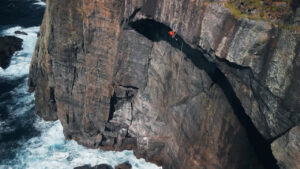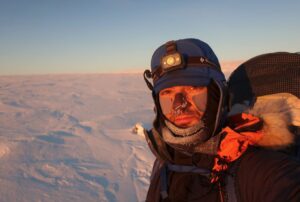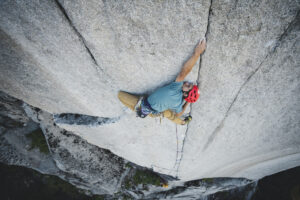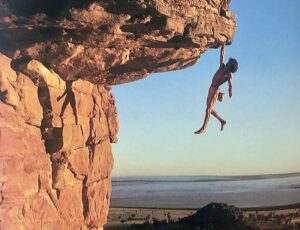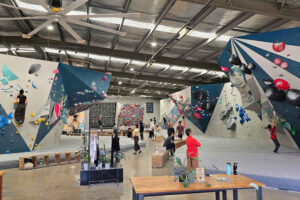On August 8, famed Canadian alpinist and climbing guide Barry Blanchard took what would be the worst fall of his long career — down a flight of stairs. The 62-year-old and his daughters were vacationing at a friend’s property in Saskatchewan when he toppled down the concrete stairs, sustaining multiple skull fractures.
Unconscious, he was rushed to the hospital. Doctors were able to stabilize his condition, but initial assessments about his recovery were ambivalent at best. His family’s initial reports indicated that he’d lost most of his memory and the ability to communicate. Facial fractures and multiple brain bleeds completed the list of injuries.
Nobody knew whether Barry Blanchard would climb again. Now, just over two months after the incident, he’s doing exactly that. Back home in Canmore, Alberta, he’s knocking out laps on the artificial climbing wall.
“I’m working on the 5.7 barrier,” Blanchard told ExplorersWeb. “I just get on autobelay and do laps. Right now, if I can do four laps, up and down, on 5.5 and 5.6, that’s a good day.”

Blanchard’s injury and recovery
It may not be The Andromeda Strain, but it’s a monumental amount of progress for an accomplished climber with a long, active career. That lifestyle, and Blanchard’s memory of it, looked to be in jeopardy while he recovered from his injuries in the Regina General Hospital.

Blanchard traverses the Cassin Ridge of Denali, 1982. Photo: Doyle/Creative Commons
“There’s an eight- or nine-day period where I don’t remember anything,” he said. “The last thing I remember is talking with my friend’s wife in their kitchen. Apparently, I fell two or three hours after that. The next memory I have is from over a week later, in the hospital.”
Despite the scare, Blanchard’s memory began to rapidly recover, with the help of occupational therapists and speech pathologists. He now reckons that his long-term memory is almost as good as it was before the accident.
“My really long-term memory seems to be very intact,” he said. “I can remember my childhood, and my early education and climbing. And most of my climbing from when I was, say, 20-40 years old is coming back!
“That being said, I may have to feel around for names of climbs or partners.” He considers for a moment. “Not that that wasn’t happening before I fell down the stairs. [Laughs.] I just have to work at it more now.”
Though Blanchard’s sense of humor remains intact, he’s transparent about how threatening the incident was. He graciously credits his recovery to support from his family, friends, and the climbing community. He also knows he wouldn’t have survived the incident itself without care from countless professionals (starting with the friend he was visiting, who’s a trained EMT).
“Because of all the fluids coming out of my mouth,” Blanchard explains, “there’s no way I would have survived without him giving me mouth-to-mouth while the ambulance was on the way.”
Interestingly, Blanchard also took responsibility for his own survival — even when he was fighting for consciousness in the hospital.
“I don’t remember exactly when, but at some point, the will to survive became clear,” he said. “I don’t know how deadly the situation was, but people die of brain injuries all the time — my family was terrified. In some chamber within me, my back was against a wall that I couldn’t see or understand. But I’m a scrappy little guy, so I came out swinging.”
In the weeks following the injury, he walked around hospital wards. Now, though he’s noticeably wobbly, he walks around town — one or two kilometers at a time, on flat surfaces.
His climbing progression has been similar, and he faces the same balance limitations. Doctors say the neural connections that govern his proprioception still haven’t fully recovered. Whether or not they will is anybody’s guess (professionals included).
What’s next for Barry Blanchard. (Back to guiding?)
While Blanchard has dutifully adhered to best practices based on his doctors’ advice, brain injuries heal on their own terms. His progress bears itself out statistically, as well as in his own perception, but his role is limited. As he puts it, he’s in the car but he’s not the one driving.
Still, he sounds robust and clear-headed in conversation. He’s not only funny and reflective by turns, but also topically cogent. Maybe the best news of all? Once his balance is back and he can lead again, he’ll resume his life as a climbing guide. Like everything else in his new life, he intends to take it one step at a time.
“Ultimately, my ambition is to get back to guiding,” he asserted. “We’ll see how that works out over time. Right now, I have to anticipate that I’ll be teaching introductory rock climbing. Which is great! All guides have a ‘best before’ date, regardless of the circumstances. So walking back the intensity is certainly not a bad thing.”
Then Blanchard pauses for a moment, considering his response. “But hopefully I can get back to guiding bigger routes in the mountains.”

